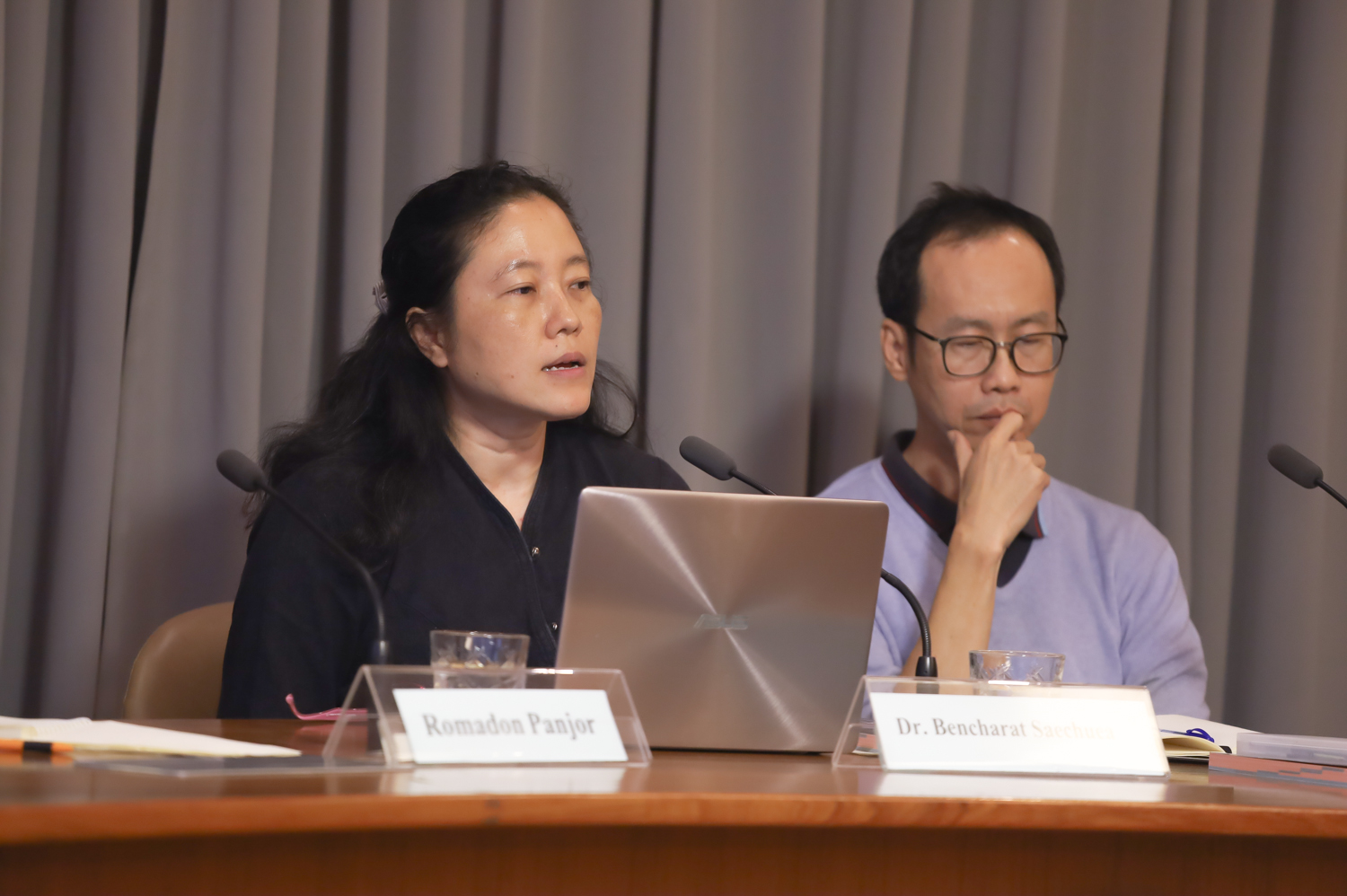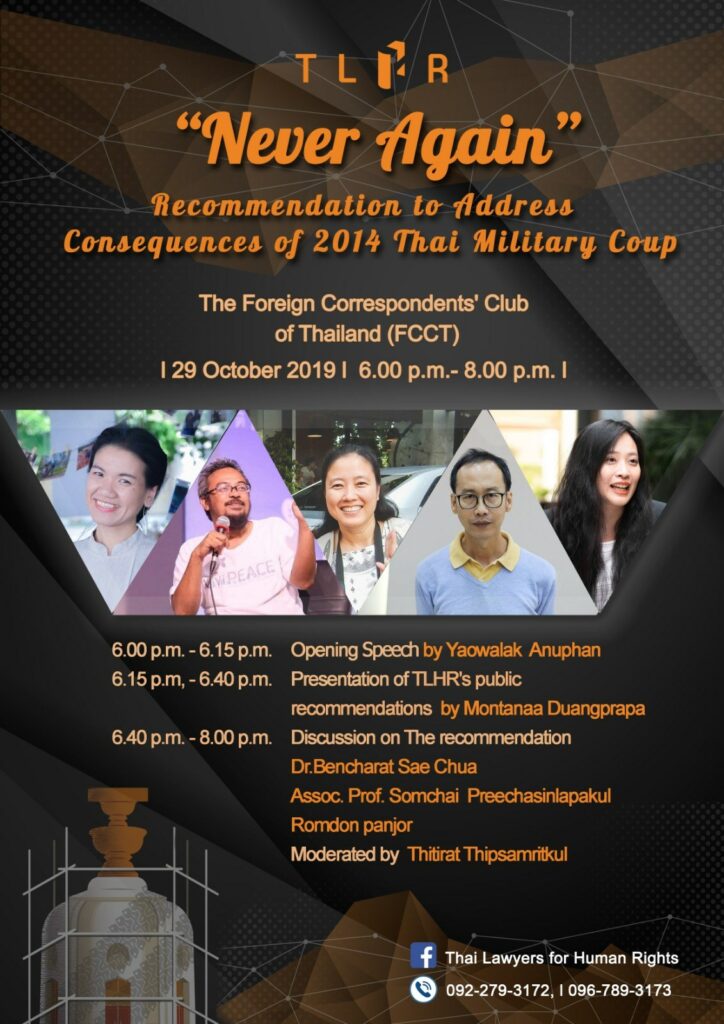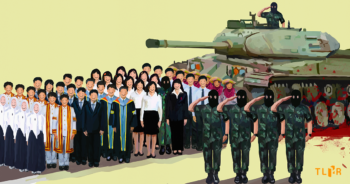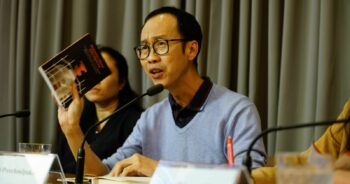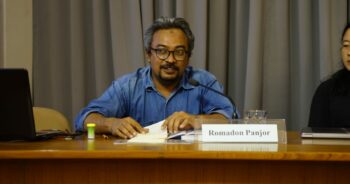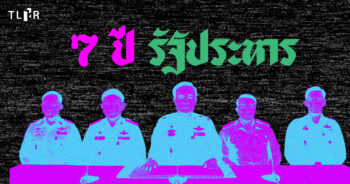| On 29 October 2019, 18.00 at the Foreign Correspondents’ Club of Thailand (FCCT), the Thai Lawyers for Human Rights (TLHR) held a public discussion entitled “Seize, Trample, Repeat, Change”, the Launch of Propositions to Remedy the Consequences of the 2014 Coup, concerning the laws, policies and justice process intended to ensure the protection of people’s rights and freedoms. The three speakers included: – Dr Bencharat Sae-Chua – Institute of Human Rights and Peace Studies, Mahidol University – Assoc. Prof. Somchai Preechasilpakul – Faculty of Law, Chiang Mai University – Romadon Panjor – Deep South Watch with Thitirat Thipsamritkul from the Faculty of Law, Thammasat University as moderator. Participants were also encouraged to share their opinions and exchange thoughts with the speakers. The publication is available at https://tlhr2014.com/?wpfb_dl=112 Video from the seminar can be viewed here https://www.facebook.com/PITVFanpage/videos/449010922639828/
|
The second speaker at the event, Ms. Bencharat Sae-Chua commented on TLHR’s proposed remedies for victims of the violations that have been taking place since the 2014 coup. Bencharat began with the importance of the principle of remedy for human rights violations. As we are transitioning into a democracy, we need to envisage a remedy beyond dealing with the consequences of the NCPO. In other words, it is important to create a human rights culture that will not tolerate another coup.
Remedy as a path towards a human rights culture
Bencharat began by touching on the importance of remedy in Thailand, where the coup-makers, who seized power from the people, have never been brought to justice.
“Professor Somchai calls it a perversion of the criminal justice process in Thailand. I would like to add to this, by calling it a perversion of human rights culture as well, not just the laws. The book sheds light on aspects that have rarely been brought up in Thailand, including the culture of human rights. In Thailand, we tend to tolerate such coups and hardly question them.”
“A string of coups has taken place to seize power from democratically elected governments in Thailand. And the coup-makers have always enjoyed amnesty. Whenever the country is subject to autocracy, a draconian power has always been wielded, giving rise to violence against the people who repeatedly come out to demand democracy. Yet lessons have never been learned, and impunity persists. People take the coups for granted. They say to topple a corrupt regime, a coup is the solution. They have exercised their draconian power in declaring a state of emergency. We scarcely condemn it and have always allowed such an impunity to go on. There has been no attempt to create a consensus among Thai people that this kind of action is wrong and should never be permitted. The proposed remedies are therefore massively important and should help to flip society’s prevailing opinion.”
The lecturer from the Institute of Human Rights and Peace Studies also encouraged people to look at the issue of remedy by examining the NCPO’s rights violations and how they have taken their toll on Thailand.
“The victims of the past five years are virtually all Thai people. Our human rights culture has been suppressed; our rights severely restricted. It is not only about thousands of people who have been put under arrest, or hundreds of them who have been prosecuted. Any remedy should be a remedy for the whole society, not just the direct victims.”
Bencharat further commented on internationally recognized human rights, which include the right to seek the remedy. This right is very important and enshrined in international human rights treaties, including the Universal Declaration of Human Rights (UDHR) which prescribes an effective remedy. A national tribunal should be set up to review any violation of the fundamental human rights prescribed by laws such as the International Covenant on Civil and Political Rights (ICCPR), which has been ratified by Thailand. As far as the right to an effective remedy is concerned, it is incumbent upon the state to offer a remedy whenever a human rights violation has taken place. The protection has to be offered pursuant to the Covenant. In the United Nations, there have been attempts to develop the principles and procedures of the remedy. The issue of remedy and accountability for human rights violations has garnered global attention since they are considered an effort to bring about a human rights culture.
As for Thailand, Bencharat said that human rights violations under NCPO rule might not appear very serious compared with widespread human rights violations in Latin American countries for example, which include thousands or tens of thousands of enforced disappearances or cases of torture. Nevertheless, “what happened in the past five years in Thailand were systematic and widespread human rights violations; it was an infringement on fundamental rights including the right to freedom of expression, the right to life, the right to be free from arbitrary detention, which are non-derogable rights.”
Remedial measures: The State must be held accountable and apologize to the public
As to the measures to remediate damage resulting from the NCPO’s rule, Bencharat proposed that the remedy for human rights violations must begin with restitution, whereby the condition prior to the human rights violation is restored. “In this case, all the laws and standards which upheld human rights prior to the 22 May 2014 coup must be restored, and all Orders made by the NCPO, be they the Head of NCPO Orders or others issued after the coup, must be rescinded, along with other laws that affect human rights, particularly social and economic rights. The orders to suspend environmental safeguards, the Special Economic Zone Act restricting people’s rights, and the Forest Reclamation Policy, all of these must be wholly rescinded. It is difficult of course, since it involves canceling hundreds of orders issued by the NCPO.”
Another principle concerns compensation. In the book, THLR proposes a method by which to calculate the compensation victims deserve. Bencharat suggested that compensation is an alternative if restitution is impossible. In such a case, financial compensation ought to be made covering accommodation and other expenses incurred from legal proceedings.
Satisfaction is another kind of remedy whereby the victims are satisfied with some form of compensation, if restitution is not possible and compensation is not quite enough. “Meeting someone’s satisfaction can be made in various ways. For example, the State might have to acknowledge its mistakes publicly and offer the public an apology. Finally, it should pave the way for an assurance of non-repetition, whereby such human rights violations shall not be repeated. To achieve that we need to develop various benchmarks. Personally, I find remedy and bringing the perpetrators to justice are the most essential components to nurture a culture of human rights and to prevent any recurrence” Bencharat stressed.
In closing, Bencharat reiterated that remedy encompasses physical, mental and symbolic compensation. Yet in Thailand, public officials have never been held accountable. A symbolic remedy is therefore very important, i.e., the State must acknowledge its involvement in human rights violations and hold the relevant public officials to account for crimes they ordered or personally committed. Criminal procedures might not be the only way to hold accountable. “One thing we can start with is to call it by its real name, i.e. the NCPO was a dictatorship, an attitude adjustment is simply an arbitrary arrest and detention. We need to use refer to them using the language of human rights. Interference with the justice process is, in fact, a breach of a fair trial, an unfair trial. Instead of calling the NCPO a sovereign power, it should be called a “gross disrespect of the people” whereby people do not at all matter in this society, etc. This is one of the ways to make society realize the violations have really happened.”
Bencharat also proposed other forms of symbolic remedy including the public disclosure of all information concerning the violations, alongside victim testimonies. In some countries, such testimonies are broadcast live, when the victims testify to a Truth Commission. This is to let the public know about the violations that have taken place. The survivors afford a chance to recount their own stories in their own words. This can help make them feel justice is done, not only through the legal proceedings. Rather, we must try to proliferate the memories, keeping them alive in society. This can be done through a commemoration or other public events, etc.
“The proposition of remedy is very pertinent in order to address the perversion of our human right culture. We need to make it known that it is wrong to treat people this way and we shall never let it happen again. And we need to set a new precedent in the future” Bencharat concluded.
For input from other speakers, please see Somchai Preechasilpakul: “The Perversion of Thai Law and the Fight of the People Who Will Not Surrender”
A summary of the book >> Public Seminar “Seize, Trample, Repeat, Change” The Launch of Recommendation Proposal to Uproot the Remains of the Coup
